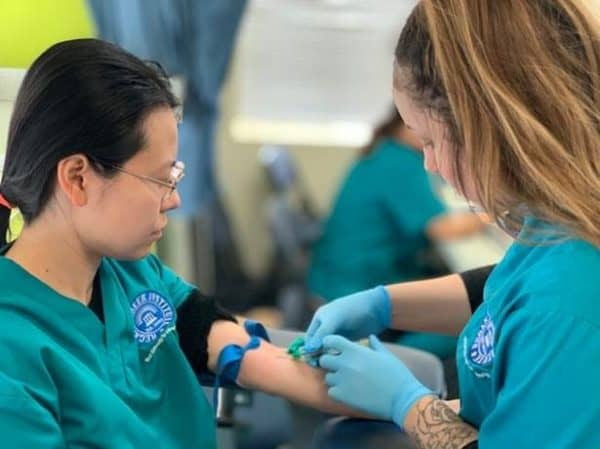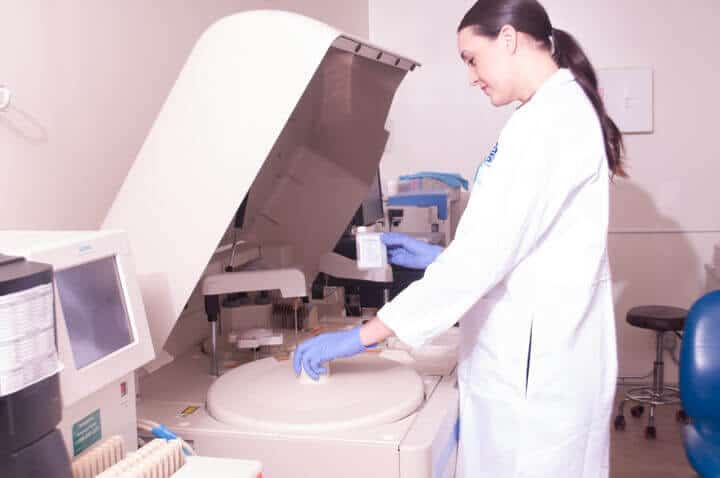The pandemic our world has experienced over the course of the last year has forced us to reflect, in some ways more tangibly than many of us were prepared to do. Career choice has been one of those major reflections as many have either lost their jobs or grown to find them unfulfilling in these uncertain times. In fact, a MetLife study found that 1 in 4 women have considered a career change in light of COVID-19.
When considering a career change, it is important to choose a field that you will find to be personally fulfilling, and which will leave a mark on the world that feels good to you. With the unstable job market we have recently experienced, it may also be beneficial to choose a career that can withstand fads, fluctuations in economy and social trends, and which will be able to provide lifelong opportunities.
One field that checks those boxes for many entering the workforce or making career changes is phlebotomy. Phlebotomy jobs are stable, yet offer some variety. Preparing for a career in this field can be speedy, requiring less investment of time or money to get started. Once certified, there are different directions one can choose to take their phlebotomy career.
What Is Phlebotomy?
A phlebotomy technician, or phlebotomist is someone who performs a blood draw for medical testing, obtains blood samples, blood tests, transfusions, blood donation centers, or other reasons. There are a variety of venues that require phlebotomy technicians, including doctors’ offices, hospitals, nursing homes, clinics, blood drives at the American Red Cross, mobile units, diagnostic centers, universities and more. Oftentimes, phlebotomists are able to work part time or full time.

In general, phlebotomy technicians are responsible for applying tourniquets, disinfecting the site of entry, and performing venipuncture, or inserting a needle into the vein to collect blood. The phlebotomist must know the phlebotomy order of draw to ensure that tubes are filled safely to avoid inaccurate test readings. The technician is also responsible for correctly labeling and transporting samples as needed. Depending on the specific job, some phlebotomists may also be responsible for a wider range of responsibilities including performing skin pricks, driving a company vehicle, creating a comfortable environment for uneasy patients, or a positive one at donation sites.
The responsibilities for a phlebotomy technician are very serious. Mistakes or contaminations can be life threatening and life altering. However, it is also a rewarding career, and its skills can be fairly quick to master. Having a skilled and compassionate phlebotomist can make the experience comforting and less scary to patients who may be facing potentially fatal illnesses, or who are having tests done which could majorly impact their lives. Patients trust their phlebotomist to accurately draw blood, but it is also a wonderful opportunity to make a positive impact on people every day.
How Do I Become a Phlebotomy Technician?
There are a variety of options for phlebotomy classes, depending on what best suits your needs. You may choose to go to a phlebotomy training program, where students can find programs that fit their scheduling needs, and tend to be much quicker to complete. Regan Career Institute offers one of the only accelerated phlebotomy programs to get you on your way to a new career in an expedited fashion. In only 80 hours you can become a Certified Phlebotomy Technician with our CPT1 training program. This program provides education and training for individuals seeking a career as a licensed California Certified Phlebotomy Technician I (CPT I), your phlebotomy certification. This is a customized accelerated program, but balanced to be completed as fast as possible but not overwhelming. Once you have successfully completed your class hours, you are required to do a minimum 40 hour externship for clinical experience. You must also obtain your National certification by taking a national exam also offered on the RCI campus.

It is important to know your local laws and requirements for phlebotomy training before making your decision. Some states simply require the completion of a phlebotomy course, while others may require an actual certification. Some phlebotomy schools may also include the cost of testing in their tuition, so it is important to know what is required, and what you plan to do personally before you choose a school. The state of California requires that all Phlebotomy Technicians or Phlebotomists who work in California hold a current California Phlebotomy License. There are various phlebotomy license requirements that must be met before and while holding a license. We shall delve into what is required for different license applications, and how to keep your license valid after successfully achieving certification.
Once you have completed your training, you can consider what specific type of phlebotomy job you would like to find. There is no shortage of opportunities in the field. In fact, phlebotomist jobs are expected to have grown 17% from 2019 to 2029. With job security, a rewarding daily routine, and a welcoming, manageable entry into the career, phlebotomy could be the exact career change you have been looking for.
Visit our homepage at www.rci.edu for more information
Learn about our 3 in One Program


